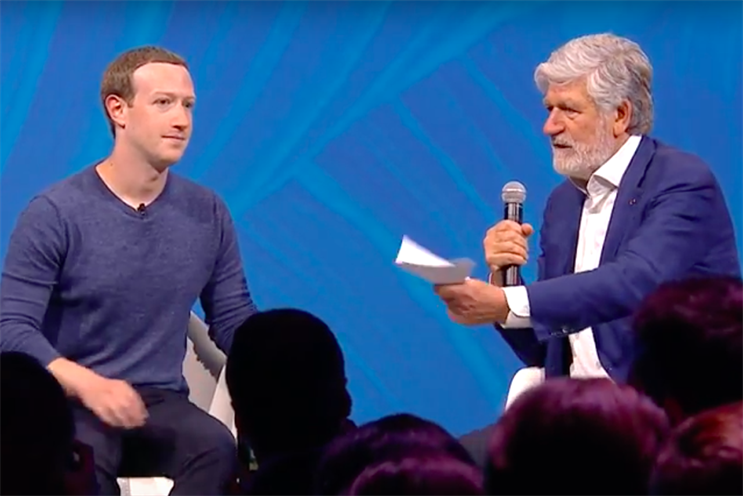
"We have a community of more than two billion... and people have different views on what content is appropriate around the world," he explained to Publicis Groupe chairman Maurice Levy during an onstage interview today (24 May) at VivaTech in Paris.
Zuckerberg has come to believe that it is necessary to formulate a set of content principles that are more informed by people around the world rather than by a few "sitting in an office in California".
"It's important and something I've tried to focus on. Hopefully, in the coming six months and maybe next year, we'll come up with some models for having a more community-oriented government," he promised.
Borrowing from systems of governance from around the world, Zuckerberg plans to build in a formal appeals process that will also help formulate the rules by which the Facebook community is policed.
"Right now we build the rules and if we decide that your post is hate speech we take it down. There hasn’t been a way for you to appeal. But every governance system should have a method for appeal. I’d like to get a higher appellate court that is independent, isn't employed by Facebook, but has an understanding of Facebook," he said.
"It will arbitrate decisions for how the community operates. So if someone disagrees with our decision... they can appeal to this group, and their decision is binding."
Cambridge Analytica
Levy also touched, reluctantly, on the subject of Cambridge Analytica to ask Zuckerberg how he feels about the scandal.
"What’s clear now... is that we didn’t take a proactive enough view for how people might use our tools for harm. Fake news, hate speech, developers using it in ways that don’t respect privacy... for most of the company’s history we’ve dealt with bad actors reactively. I don’t think that’s enough now," Zuckerberg said.
He went on to reiterate his promise to have more than 20,000 people employed to help combat these "bad actors" by the end of the year.
"When you look at the other issues we face, protecting election integrity… we have a lot of work to do here and we’re confident we can get in front of this but the priority is making sure we do a good job," he added, raising his voice somewhat to compete with a restless audience.
When asked about GDPR by Levy, however, Zuckerberg's answer was perhaps less than reassuring.
"I don't believe GDPR will make that big of a change to how Facebook operates," Zuckerberg insisted. "It's not a massive departure from how we've always thought about stuff, about how we provide people with choice and control."
He elaborated that, in his view, GDPR is about control, transparency and accountability, values that Facebook has "always shared".
"A 100 billion times a day, someone will use our services and every time it’s clear they have a control of who they want to share content with. That’s important because you don’t feel safe if you don’t have control," he said.
The team at Facebook has been working hard to ensure compliance, he continued, and on the whole, good regulations can inspire trust that these systems are working.
"I think GDPR could be a good step in that direction," Zuckerberg said. "There is no doubt though that going forward we have a huge amount of responsibility - more than I ever thought we would have when we started to build the company."




.jpg)
.jpeg)
